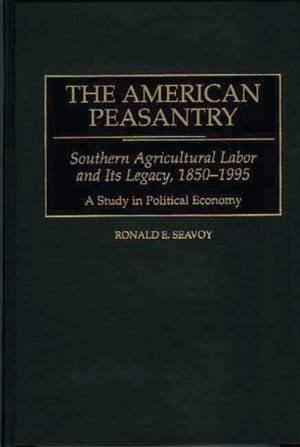
Je cadeautjes zeker op tijd in huis hebben voor de feestdagen? Kom langs in onze winkels en vind het perfecte geschenk!
- Afhalen na 1 uur in een winkel met voorraad
- Gratis thuislevering in België vanaf € 30
- Ruim aanbod met 7 miljoen producten
Je cadeautjes zeker op tijd in huis hebben voor de feestdagen? Kom langs in onze winkels en vind het perfecte geschenk!
- Afhalen na 1 uur in een winkel met voorraad
- Gratis thuislevering in België vanaf € 30
- Ruim aanbod met 7 miljoen producten
Zoeken
The American Peasantry
Southern Agricultural Labor and Its Legacy, 1850-1995, a Study in Political Economy
Ronald E Seavoy
€ 161,45
+ 322 punten
Omschrijving
A sweeping overview of the American peasantry: the largely sharecrop cultivators who, in Seavoy's analysis, rejected the labor norms of commercial agriculture. About equal numbers of black and white sharecroppers chose to practice subsistence cultivation in order to minimize agricultural labor. The study begins with pre-Civil War slave plantations and the landless white peasants who migrated to North America to escape full-time paid labor in Britain. Seavoy then describes and analyzes the operation of the postbellum sharecrop system and related Back Caste System; the different origins of southern and northern Populism; the massive displacement of southern peasants (after 1950) when cotton cultivation was fully mechanized, and how the voluntary joblessness of the urban underclass has been perpetuated by the welfare entitlements of the Great Society.
Specificaties
Betrokkenen
- Auteur(s):
- Uitgeverij:
Inhoud
- Aantal bladzijden:
- 616
- Taal:
- Engels
- Reeks:
- Reeksnummer:
- nr. 200
Eigenschappen
- Productcode (EAN):
- 9780313275111
- Verschijningsdatum:
- 30/11/1998
- Uitvoering:
- Hardcover
- Formaat:
- Genaaid
- Afmetingen:
- 165 mm x 242 mm
- Gewicht:
- 984 g

Alleen bij Standaard Boekhandel
+ 322 punten op je klantenkaart van Standaard Boekhandel
Beoordelingen
We publiceren alleen reviews die voldoen aan de voorwaarden voor reviews. Bekijk onze voorwaarden voor reviews.









